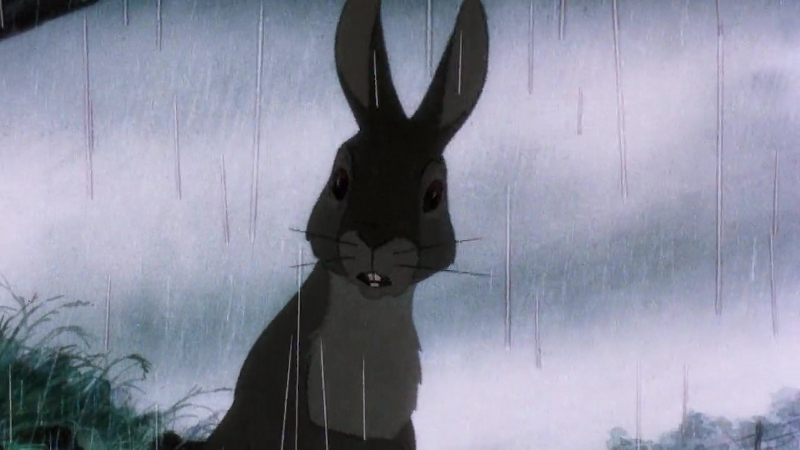Director – Martin Rosen – 1978 – UK – Cert. PG – 92m
*****
When a young rabbit visionary foresees doom for those who remain, some of the rabbits leave their warren in search of a safer home, encountering many life-threatening perils along the way – new 4K restoration of animated feature is out in UK cinemas on Friday, October 25th, following its World Premiere in the London Film Festival on Saturday, October 12th
LFF: Sat 12 Oct 12:20 World Premiere, Tues 15 Oct 12:15,
both BFI Southbank NFT1.
This opens with a mythological segment involving a powerful God, represented as the sun, and rabbitkind, specifically the archetypal rabbit El-ahrairah. It’s drawn and painted in an arresting, non-naturalistic style involving coloured lines animated against a white background to create the impression of moving, primitive drawings, due in large part to uncredited director John Hubley, whose vision for the film was at odds with that of producer Martin Rosen. The latter ended up firing the former as he wanted something grittier and less lightweight.

It’s arguable this has worked to the film’s advantage: the fable sequence works as otherworldly rabbit mythology, suggesting a race of intelligent creatures capable of constructing creation myths about their species much as human beings do. However, the body of the film, which Rosen stepped in to direct himself, is rendered in a style and production process much closer to that codified by Walt Disney – characters whose volumes are coloured in and whose edges are defined by drawn lines, while lavishly designed backgrounds are painted in great detail. Rosen innovates to a degree by making the backgrounds look a lot like watercolour paintings, reminiscent of natural history illustration.
However impressive that might be, it’s not the piece’s real strength. Richard Adams’ source novel, although intended to be suitable for children, boasts not only rabbit mythology but also has its talking rabbits confronting and confronted by difficult life crises, often of a traumatic and violent nature.
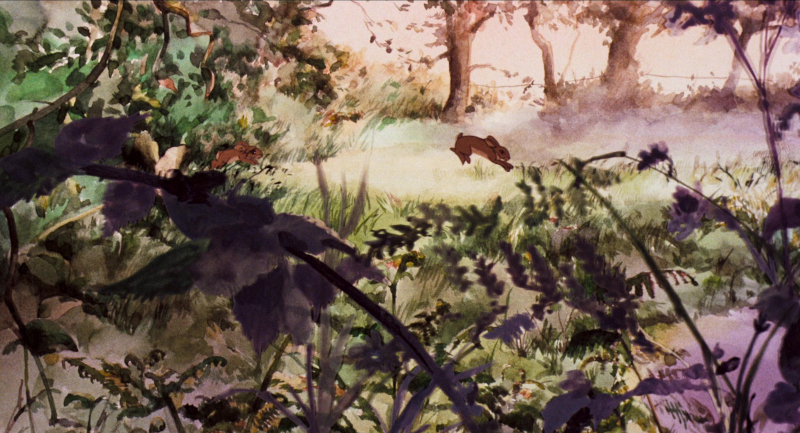
The film version of Watership Down took its cue from the book, guided perhaps by Rosen’s previous work as the producer of the Oscar-winning D.H. Lawrence adaptation Women in Love (Ken Russell, 1969), and brought some of Adams’ difficult material to the screen, refusing to shy away from such disturbing concepts as the collapse of a decadent society, resistance to a totalitarian regime or the (sometimes violent) perils of a group leaving their home in search of a better place. (The latter idea has even greater resonance at the current time, with the climate crisis increasing migration of those in poorer, affected countries towards the so-called, less affected developed nations.)
A young rabbit named Fiver (voice: Richard Briers) warns an older rabbit Hazel (voice: John Hurt) that a disaster is about to befall their warren. Knowing Fiver to have been right about such things before, Hazel must go through Bigwig (voice: Michael Graham Cox) to speak to the Chief (voice: Ralph Richardson).
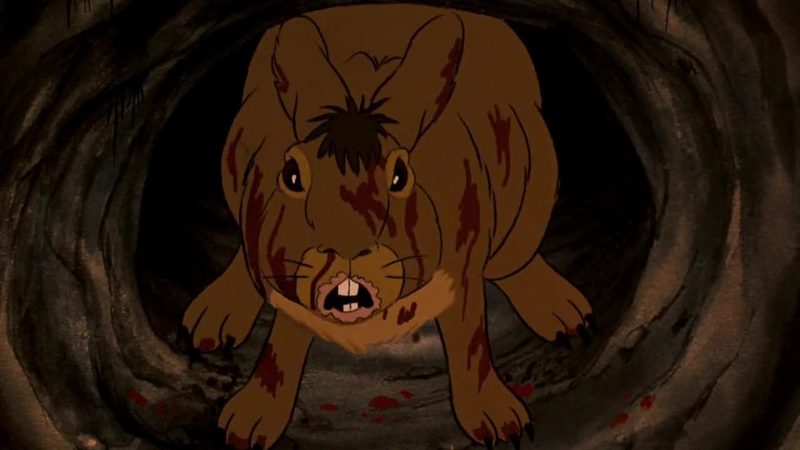
When the Chief chooses to ignore their warnings. Hazel, Fiver and a number of other rabbits – including Bigwig – decide to set off to find somewhere safer. Most of the party are male. They have a run in with the warren’s chief of police, Captain Holly (voice: John Bennett), and leave him for dead.
As they journey through the woods and across the countryside towards their destination, they encounter numerous perils.
One of them is snatched by a hawk and never seen again. One of them is fatally caught in a snare. They run into another rabbit called Cowslip (voice: Denholm Elliot) who, it turns out, is living in a warren which a farmer is using to catch rabbits, giving Cowslip a constant supply of fresh food with which he is able to lull visitors into a false sense of security.
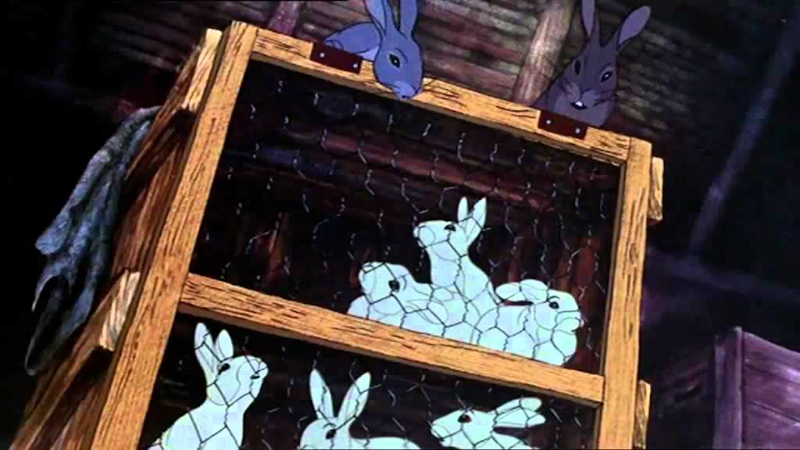
They run into a farm which keeps a dog and a cat, both lethal to the rabbits, and – in cages – female rabbits.
Eventually, they will arrive at the safe haven of Watership Down and befriend an injured seagull Kehaar (voice: Zero Mostel, in his last screen role). They hear rumours of and later find themselves forced to deal with the rabbit kingdom of the Efrarans, which is organised by its despotic leader General Woundwort (voice: Harry Andrews) along militarised lines.
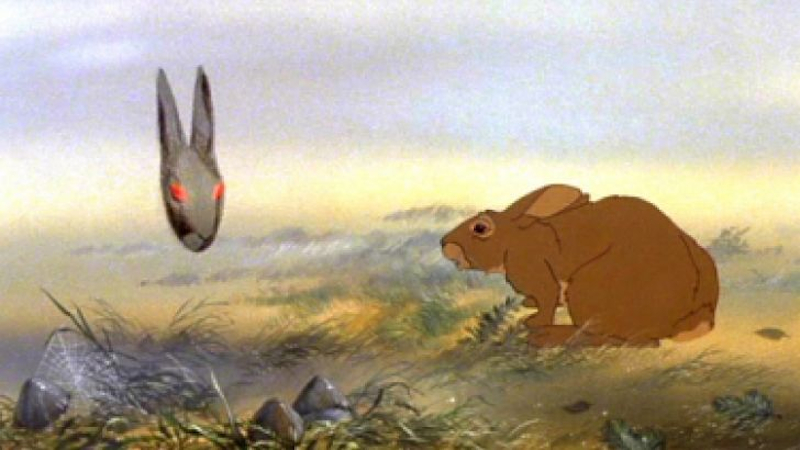
Finally, Hazel will meet the Black Rabbit of Death, as all rabbits must, and go on the journey from which there is no return.
When this British animated feature was originally released in 1978, animated films were synonymous with Disney, and the chance to see animation in the cinema that didn’t conform to that model was rare. However, this film took a very different tack from the sentimentalised, anthropomorphised animal tales for which that Studio was known. Although these rabbits talk like humans, they are essentially characters in a dark and often violent drama – nature red in tooth and claw, if you will.
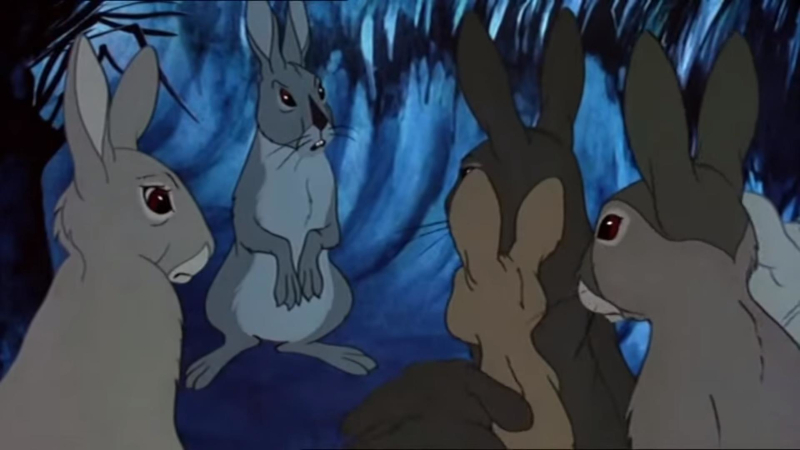
The whole thing works provided you approach the characters as a group of rabbits, but try and follow who’s who in the rabbit cast, and you quickly come unstuck. That aside, almost half a century later (I somehow never saw it on its original release) it remains a benchmark as to the potential of animated storytelling for tackling life and death issues. Powerful stuff: once seen, not easily forgotten.
Watership Down is out in cinemas in the UK on Friday, October 25th, following its UK Premiere in the London Film Festival on Saturday, October 12th.
LFF: Sat 12 Oct 12:20 World Premiere, Tues 15 Oct 12:15,
both BFI Southbank NFT1.
[Read my shorter, more religion-oriented review for Reform magazine.]
Trailer:
